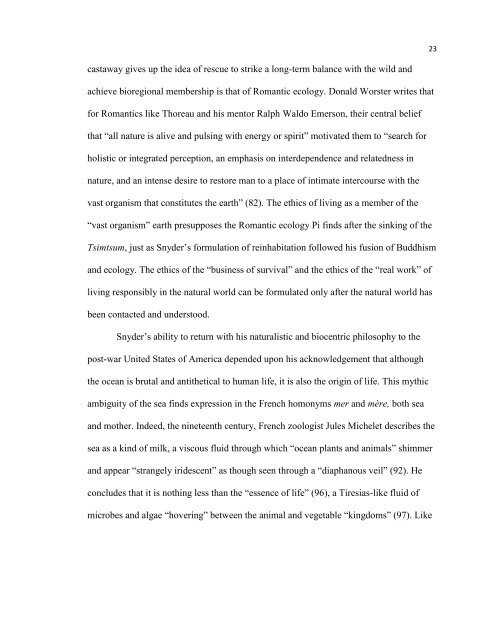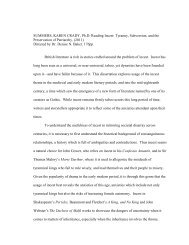RE-INHABITING THE ISLANDS - The University of North Carolina at ...
RE-INHABITING THE ISLANDS - The University of North Carolina at ...
RE-INHABITING THE ISLANDS - The University of North Carolina at ...
You also want an ePaper? Increase the reach of your titles
YUMPU automatically turns print PDFs into web optimized ePapers that Google loves.
23<br />
castaway gives up the idea <strong>of</strong> rescue to strike a long-term balance with the wild and<br />
achieve bioregional membership is th<strong>at</strong> <strong>of</strong> Romantic ecology. Donald Worster writes th<strong>at</strong><br />
for Romantics like Thoreau and his mentor Ralph Waldo Emerson, their central belief<br />
th<strong>at</strong> ―all n<strong>at</strong>ure is alive and pulsing with energy or spirit‖ motiv<strong>at</strong>ed them to ―search for<br />
holistic or integr<strong>at</strong>ed perception, an emphasis on interdependence and rel<strong>at</strong>edness in<br />
n<strong>at</strong>ure, and an intense desire to restore man to a place <strong>of</strong> intim<strong>at</strong>e intercourse with the<br />
vast organism th<strong>at</strong> constitutes the earth‖ (82). <strong>The</strong> ethics <strong>of</strong> living as a member <strong>of</strong> the<br />
―vast organism‖ earth presupposes the Romantic ecology Pi finds after the sinking <strong>of</strong> the<br />
Tsimtsum, just as Snyder‘s formul<strong>at</strong>ion <strong>of</strong> reinhabit<strong>at</strong>ion followed his fusion <strong>of</strong> Buddhism<br />
and ecology. <strong>The</strong> ethics <strong>of</strong> the ―business <strong>of</strong> survival‖ and the ethics <strong>of</strong> the ―real work‖ <strong>of</strong><br />
living responsibly in the n<strong>at</strong>ural world can be formul<strong>at</strong>ed only after the n<strong>at</strong>ural world has<br />
been contacted and understood.<br />
Snyder‘s ability to return with his n<strong>at</strong>uralistic and biocentric philosophy to the<br />
post-war United St<strong>at</strong>es <strong>of</strong> America depended upon his acknowledgement th<strong>at</strong> although<br />
the ocean is brutal and antithetical to human life, it is also the origin <strong>of</strong> life. This mythic<br />
ambiguity <strong>of</strong> the sea finds expression in the French homonyms mer and mère, both sea<br />
and mother. Indeed, the nineteenth century, French zoologist Jules Michelet describes the<br />
sea as a kind <strong>of</strong> milk, a viscous fluid through which ―ocean plants and animals‖ shimmer<br />
and appear ―strangely iridescent‖ as though seen through a ―diaphanous veil‖ (92). He<br />
concludes th<strong>at</strong> it is nothing less than the ―essence <strong>of</strong> life‖ (96), a Tiresias-like fluid <strong>of</strong><br />
microbes and algae ―hovering‖ between the animal and vegetable ―kingdoms‖ (97). Like
















